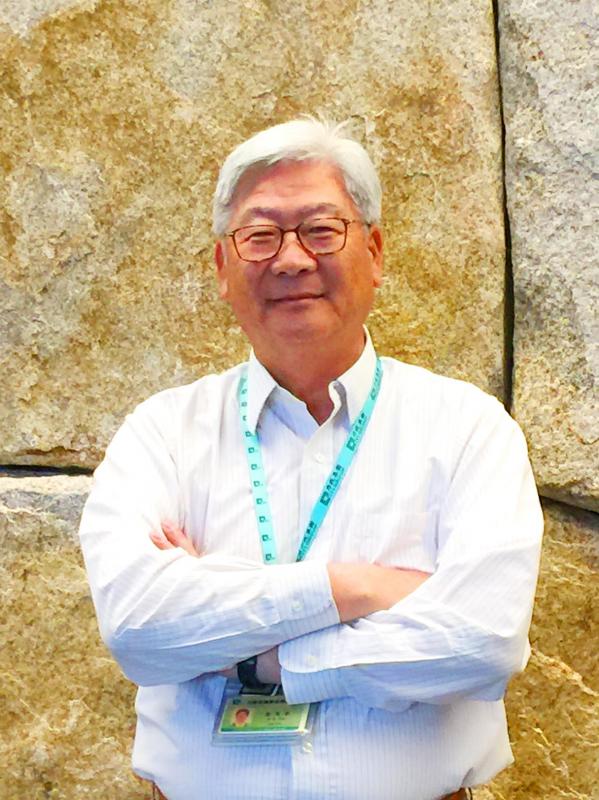Powertech Technology Inc (力成科技) yesterday said the COVID-19 pandemic would not be an obstacle to it making a record-high revenue this year, after posting its strongest first-quarter net profits in about nine years amid robust solid-state-disk (SSD) demand.
The Hsinchu-based memorychip packager and tester said most of its factories in Taiwan, China and Japan have been operating normally, unaffected by the outbreak.
“We still hold an optimistic and positive view about the second quarter. Local governments have reined in the spread of the pandemic, allowing Powertech’s fabs to operate smoothly,” chairman D.K. Tsai (蔡篤恭) told investors.

Photo: Hung Yu-fang, Taipei Times
“Some might be worried about the impact of [high] inventory [amid concern over supply disruptions last quarter], but we are seeing strong customer demand for the third and fourth quarters,” Tsai said. “We believe Powertech’s [revenue] will climb to a historical high this year, unfazed by COVID-19.”
Its confidence is also built on healthy fundamentals, as 5G-related applications, such as smartphones and 5G-enabled infrastructure and networking devices, are to fuel growth, the firm said.
Work-from-home, e-learning, e-commerce and game consoles are also stimulating demand for data centers, PCs and memory chips used in those devices, it said.
Powertech expects “a positive growth in revenue for the second quarter,” president Hung Chia-yu said.
Its DRAM business is expected to outgrow that of NAND flash memory, benefiting from launches of new smartphones and high-speed graphics, and ongoing momentum from notebook computers and data centers, he said.
Demand for system-in-package (SiP) modules has also been strong, driven by increasing consumption of SSD storage for data centers, he said.
Powertech is adding capacity this year after its loading rate climbed to 95 percent last quarter, Hung said.
Overall, loading rate for packaging services is expected to rise to as high as 85 percent this quarter, from 80 percent last quarter, he said.
Net profit jumped to NT$1.63 billion (US$54.15 million) in the first quarter, compared with NT$1.05 billion in the same period last year, marking the best first-quarter in about nine years.
On a quarterly basis, net profit dipped 21.6 percent from NT$2.01 billion, which was an all-time high.
Earnings per share rose to NT$2.1 from NT$1.36 a year ago, but down from NT$2.68 in the previous quarter.
The pandemic has delayed construction on its first panel-based packaging fab in Hsinchu by one to two quarters, but it still aims to complete construction in the fourth quarter this year, paving the way for small-volume production in the second half of next year as scheduled, Powertech said.

UNCERTAINTY: Innolux activated a stringent supply chain management mechanism, as it did during the COVID-19 pandemic, to ensure optimal inventory levels for customers Flat-panel display makers AUO Corp (友達) and Innolux Corp (群創) yesterday said that about 12 to 20 percent of their display business is at risk of potential US tariffs and that they would relocate production or shipment destinations to mitigate the levies’ effects. US tariffs would have a direct impact of US$200 million on AUO’s revenue, company chairman Paul Peng (彭雙浪) told reporters on the sidelines of the Touch Taiwan trade show in Taipei yesterday. That would make up about 12 percent of the company’s overall revenue. To cope with the tariff uncertainty, AUO plans to allocate its production to manufacturing facilities in

TAKING STOCK: A Taiwanese cookware firm in Vietnam urged customers to assess inventory or place orders early so shipments can reach the US while tariffs are paused Taiwanese businesses in Vietnam are exploring alternatives after the White House imposed a 46 percent import duty on Vietnamese goods, following US President Donald Trump’s announcement of “reciprocal” tariffs on the US’ trading partners. Lo Shih-liang (羅世良), chairman of Brico Industry Co (裕茂工業), a Taiwanese company that manufactures cast iron cookware and stove components in Vietnam, said that more than 40 percent of his business was tied to the US market, describing the constant US policy shifts as an emotional roller coaster. “I work during the day and stay up all night watching the news. I’ve been following US news until 3am

Taiwan will prioritize the development of silicon photonics by taking advantage of its strength in the semiconductor industry to build another shield to protect the local economy, National Development Council (NDC) Minister Paul Liu (劉鏡清) said yesterday. Speaking at a meeting of the legislature’s Economics Committee, Liu said Taiwan already has the artificial intelligence (AI) industry as a shield, after the semiconductor industry, to safeguard the country, and is looking at new unique fields to build more economic shields. While Taiwan will further strengthen its existing shields, over the longer term, the country is determined to focus on such potential segments as

COLLABORATION: Given Taiwan’s key position in global supply chains, the US firm is discussing strategies with local partners and clients to deal with global uncertainties Advanced Micro Devices Inc (AMD) yesterday said it is meeting with local ecosystem partners, including Taiwan Semiconductor Manufacturing Co (TSMC, 台積電), to discuss strategies, including long-term manufacturing, to navigate uncertainties such as US tariffs, as Taiwan occupies an important position in global supply chains. AMD chief executive officer Lisa Su (蘇姿丰) told reporters that Taiwan is an important part of the chip designer’s ecosystem and she is discussing with partners and customers in Taiwan to forge strong collaborations on different areas during this critical period. AMD has just become the first artificial-intelligence (AI) server chip customer of TSMC to utilize its advanced